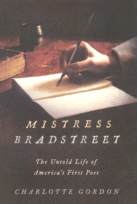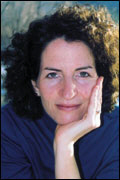Why I Wrote Mistress Bradstreet
by Charlotte Gordon
 People often ask how I, a reasonably au courant, twenty-first century sort of person, came to write a biography of Anne Bradstreet, a deeply religious Puritan poet who lived over three hundred and fifty years ago. On the surface, the two of us seem an improbable pairing. After all, my last literary endeavor was a collection of poems entitled When the Grateful Dead Came to St. Louis. From acid to Anne. From sex and rock and roll to chastity belts and psalms. What happened to Charlotte? my friends wanted to know.
People often ask how I, a reasonably au courant, twenty-first century sort of person, came to write a biography of Anne Bradstreet, a deeply religious Puritan poet who lived over three hundred and fifty years ago. On the surface, the two of us seem an improbable pairing. After all, my last literary endeavor was a collection of poems entitled When the Grateful Dead Came to St. Louis. From acid to Anne. From sex and rock and roll to chastity belts and psalms. What happened to Charlotte? my friends wanted to know.
Certainly, once upon a time, if I had met a writer who was bent on telling Anne's story, I, too, would have been mystified. Why write about Puritans, the horrible people who tortured Hester Prynne in The Scarlet Letter? Weren't they repressive, repressed, and tyrannical? How could any great art be created during such a primitive time?
But sometimes even hipsters need the past in order to understand the present. When I began my writing life as a poet, the two most famous female poets were Sylvia Plath and Anne Sexton, both of whom committed suicide. I was haunted by the idea that, for women poets, art and self-destruction went hand-in-hand. Maybe it was impossible to be both a poet and a survivor. Maybe the two had to cancel each other out.
In 1991, I moved to Ipswich, Massachusetts and took a job as an English teacher. Anne Bradstreet was the first author on the course syllabus and I dreaded teaching her work. Having never actually studied Anne in school, all I knew about her was that she was the "first" American poet, whose appearance in textbooks and anthologies seemed merely obligatory. Besides, I considered anything to do with the Puritans boring.
The day before my first class, I noticed a historical plaque mounted on a stone three doors down from my apartment. This seemed curious: What significant event could have happened in sleepy little Ipswich? Did George Washington stop here? But no, the plaque proclaimed the odd fact that Anne and her husband, Simon, had once lived here, right down the street from me. I got one of those shivery thrills that happen sometimes when you experience a strange synchronicity. That night I read my long ago neighbor's poetry with sharpened attention and was astonished at the power and intelligence of her voice. In class the next day, I read aloud some of my favorite lines and the students were thrilled. But when they asked me about her life, I had to admit that I knew nothing about her except that she had once lived in Ipswich.
Curious, I started to dig around for details about her life. At the local library, I found that only two biographies had been written and both were out of print. Suddenly Anne's life seemed like a mystery, one I became increasingly intent on solving: Who was this woman? How had she managed to write such extraordinary poems? She must have been well-educated, which struck me as remarkable for a woman of her time.
Over the next fourteen years, I embarked on a search for the hidden of life of Mistress Bradstreet. To my delight, I found that she was a courageous, likeable, and fascinating woman, who bore eight healthy babies, founded three Massachusetts towns, and wrote the first book of poetry from the New World. A brave and determined pioneer, she seemed the perfect antidote to her more famous modern counterparts. I traveled to the Massachusetts towns where Anne had lived, read and re-read Anne's poems, and tried to imagine what it must have been like to be eighteen years old and struggle through the ordeal of settling a new country. The closer I drew, the more she receded, like a ghost.
In many ways, the book Mistress Bradstreet is the story of my quest for Anne, a quest that has never really ended. Despite all of my research, she remains stubbornly bewildering, a chimera, at the same time that she inspires me with her courage and grace. During an era that was hostile to intellectual women, she penned more lines of important verse than many of the men of her generation. Her political commentary and her explanation of the role of the New World in human history would help Americans of the next generations understand who they were and what it meant to be American. Like that famous intellectual of the next century, Ben Franklin, her ideas would help shape a country and a national identity.
Strange though it sounds, Anne's cultural sway and her enormous popularity during her own time suggests that she may have had more in common with Jerry Garcia than I realized when I began this journey.
 Charlotte Gordon, the author of
Mistress Bradstreet: The Untold Life of America's First Poet, first fell in love
with the seventeenth-century poet Anne Bradstreet in 1991. Charlotte began her own
writing life as a poet, and has published two books of poetry: When The Grateful Dead
Came To St. Louis and Two Girls on a Raft. Her work has received many prizes,
including a Robert Penn Warren Award, and has been featured on the radio show,
"Art in the Air." Charlotte received an undergraduate degree in English and
American Literature from Harvard University and a Ph.D. from Boston University
where she was awarded the Alumnae Award for the most distinguished dissertation.
A post-doctoral fellow at Boston
University, she taught Religion and Literature in the Department of Theology and
from 1999-2002 was a lecturer in Elie Wiesel's seminars, The Literature of Memory.
Charlotte currently teaches Drama at the Glen Urquhart School in Beverly, Massachusetts,
and conducts writing workshops for adults from her home in Gloucester, Massachusetts.
Charlotte Gordon, the author of
Mistress Bradstreet: The Untold Life of America's First Poet, first fell in love
with the seventeenth-century poet Anne Bradstreet in 1991. Charlotte began her own
writing life as a poet, and has published two books of poetry: When The Grateful Dead
Came To St. Louis and Two Girls on a Raft. Her work has received many prizes,
including a Robert Penn Warren Award, and has been featured on the radio show,
"Art in the Air." Charlotte received an undergraduate degree in English and
American Literature from Harvard University and a Ph.D. from Boston University
where she was awarded the Alumnae Award for the most distinguished dissertation.
A post-doctoral fellow at Boston
University, she taught Religion and Literature in the Department of Theology and
from 1999-2002 was a lecturer in Elie Wiesel's seminars, The Literature of Memory.
Charlotte currently teaches Drama at the Glen Urquhart School in Beverly, Massachusetts,
and conducts writing workshops for adults from her home in Gloucester, Massachusetts.
Return to the June 2005 issue of The IWJ.
